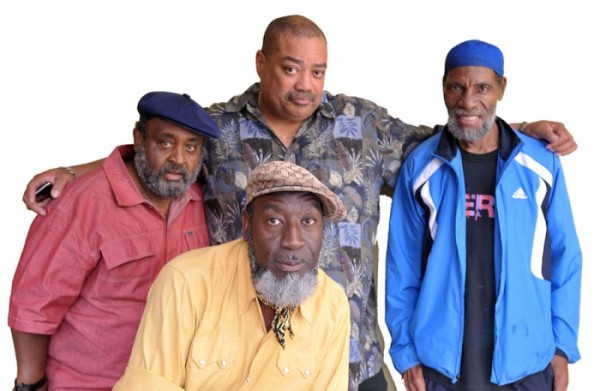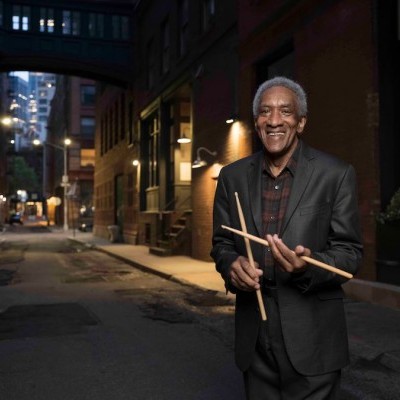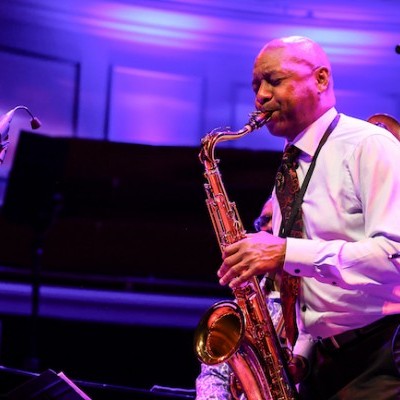Jun 3, 2025 11:25 AM
In Memoriam: Al Foster, 1943–2025
Al Foster, a drummer regarded for his fluency across the bebop, post-bop and funk/fusion lineages of jazz, died May 28…

Jamaaladeen Tacuma (center) produced the most recent album for The Last Poets, a collaborative effort called Transcending Toxic Times.
(Photo: Courtesy Jamaaladeen Tacuma)Jamaaladeen Tacuma, the electric bassist best known for his years with Ornette Coleman’s Prime Time, has independently produced a convention-defying album that’s both musically compelling and outspokenly political.
Transcending Toxic Times highlights the boldly performed poetry of The Lasts Poets, set to piquant, playful, funky grooves and, sometimes, starker surroundings. It steeped for seven years following its first studio session—when instrumental settings for all but one of the album’s tracks were laid down live. And the result is unusually powerful and polished, as immediate as—but much more literate than—today’s tweets.
“In seven years, nothing’s changed, that’s the scariest thing,” Tacuma, 63, said over the phone from his home in Philadelphia while discussing social issues addressed on the album.
On 14 poems, Umar Bin Hassan and Abiodun Oyewole and poet-percussionist Baba Donn Babatunde dig into the Black Lives Matter movement, the destructive and seductive lure of violence, the pre-eminence of soul and the adoration of a soul-mate. They encourage self-empowerment, and critique the accomplishments and myths of jazz and blues icons. Overall, the group indicts the America that historically has been bigoted, racist, violent, malignant, blind to its evils and heedlessly blithe about it all. Yet, facing these truths is uplifting. When Oyewole, Bin Hassan and Babatunde first heard the finished product, Tacuma reported, tears came to their eyes.
“They said they think this is their definitive recording, in terms of everything they’ve experienced, everything they’ve been through as a group and individually,” Tacuma said. “It shows how they’ve come to the point where they are able to write, with all the crazy stuff going on, still with a ray of hope. They were really moved by it and that made me feel so good.”
So he should.
Transcending Toxic Times is a complex and multidimensional project, which never seems unclear or overcrowded. There are six voices—mostly male, although Ursula Rucker and Lady Alma have spotlit roles—supported by conga or djembe and small bells or chimes. A core of four musicians—Tacuma with guitarist Richard Tucker, keyboardist Yoichi Uzeki and drummer Khary Abdul Shaheed—also is abetted by six guest soloists.
On pieces mostly clocking in at more than five minutes, the Poets charge listeners to get at the truth, get smart and get it together; Tacuma’s players reinforce and enrich those messages. The Poets did almost all their work in their own day-long session, the music tailor-fit in advance.
Tacuma felt that was, after all, the job he’d been prepping for, since first hearing The Last Poets during high school. He jammed on “The Creator Has A Master Plan” with the group at one of its Philadelphia dates back in the ’90s and truly bonded with all involved when saxophonist David Murray brought them together in Paris at the 2008 Banlieues Bleues Festival.
“I heard them perform and said to myself, ‘Man, this is some unique material they have,’” Tacuma began. “‘If only this could really be put together with music that won’t take away from what they’re doing, but will add to it.’ ... Umar Bin Hassan made the point that the music caresses the vocals. That makes sense to me. I wanted to make sure the vocals were the most important thing, but the question was how do you do that with the music when everybody wants to solo? I had to approach the project with a certain kind of thinking.”
Tacuma had plenty of opportunity to develop and hone such thinking while immersed in visionary Ornette Coleman’s amplified ensemble—both on tour and on recordings between ’75 and ’87. The bassist had come to that iconoclastic band at its very start, following a short stint with organist Charles Earland, a gig he’d taken in lieu of enrolling as a scholarship student at Berklee College of Music. (“He fired me, he said, because of my timing, but I think it was my coming onstage with white Earth shoes, gold guitar strap, white Rickenbacker bass guitar, playing like a 19-year-old, the whole fusion thing, getting the crowd crazy,” Tacuma said.)

Foster was truly a drummer to the stars, including Miles Davis, Sonny Rollins and Joe Henderson.
Jun 3, 2025 11:25 AM
Al Foster, a drummer regarded for his fluency across the bebop, post-bop and funk/fusion lineages of jazz, died May 28…

“Branford’s playing has steadily improved,” says younger brother Wynton Marsalis. “He’s just gotten more and more serious.”
May 20, 2025 11:58 AM
Branford Marsalis was on the road again. Coffee cup in hand, the saxophonist — sporting a gray hoodie and a look of…

“What did I want more of when I was this age?” Sasha Berliner asks when she’s in her teaching mode.
May 13, 2025 12:39 PM
Part of the jazz vibraphone conversation since her late teens, Sasha Berliner has long come across as a fully formed…

Roscoe Mitchell will receive a Lifetime Achievement award at this year’s Vision Festival.
May 27, 2025 6:21 PM
Arts for Art has announced the full lineup for the 2025 Vision Festival, which will run June 2–7 at Roulette…

Benny Benack III and his quartet took the Midwest Jazz Collective’s route for a test run this spring.
Jun 3, 2025 10:31 AM
The time and labor required to tour is, for many musicians, daunting at best and prohibitive at worst. It’s hardly…